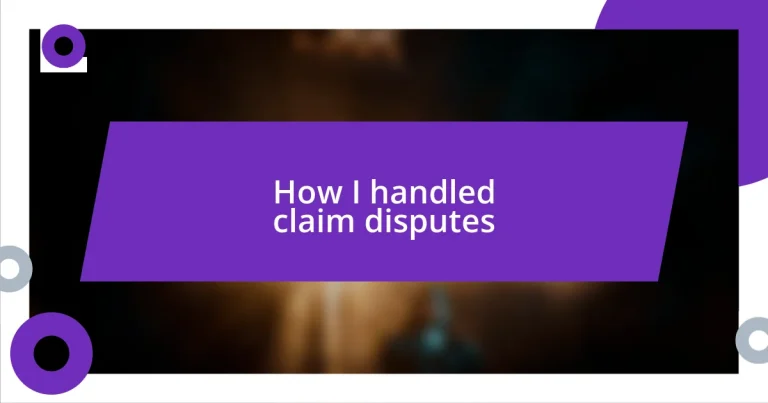Key takeaways:
- Understanding policy terms and effective communication are crucial in resolving claim disputes and can lead to more positive outcomes.
- Gathering and organizing essential documentation can strengthen your case and help prevent delays or misunderstandings.
- Seeking professional assistance, such as advice from claim consultants or attorneys, can significantly reduce stress and improve the negotiation process.
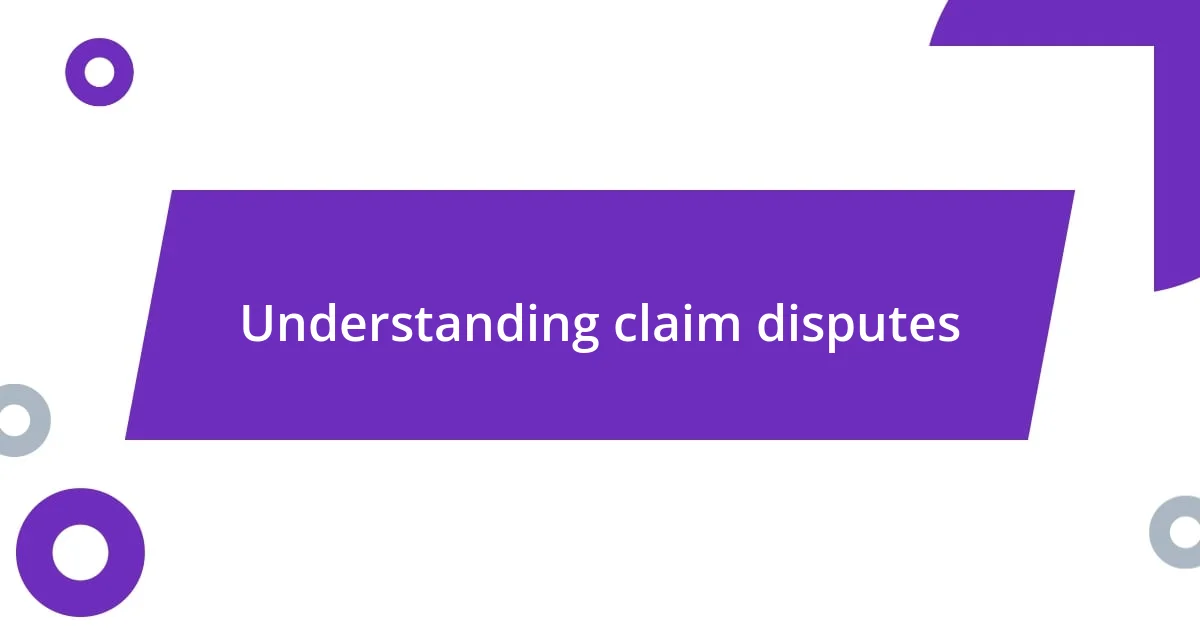
Understanding claim disputes
Claim disputes can be a source of significant stress, both for individuals and businesses. I remember a time when I faced a dispute over a claim that felt completely unfounded. It made me realize how crucial it is to understand the terms of your policy; without that knowledge, misunderstandings can spiral out of control.
Navigating a claim dispute requires patience and clear communication. When I was dealing with a complex situation, I found that keeping detailed records of all interactions made a world of difference. Have you ever felt overwhelmed by the process? Taking the time to document every phone call and email not only provided me with clarity but also strengthened my position when it came time to negotiate.
Ultimately, understanding the nuances of a claim dispute can turn a frustrating experience into a manageable one. Sometimes, it’s just about seeing the bigger picture and remaining calm. I often think about how emotional investments can cloud judgment—have you found that to be true? Keeping a level head allows for more constructive conversations, which can lead to resolutions that benefit both parties involved.
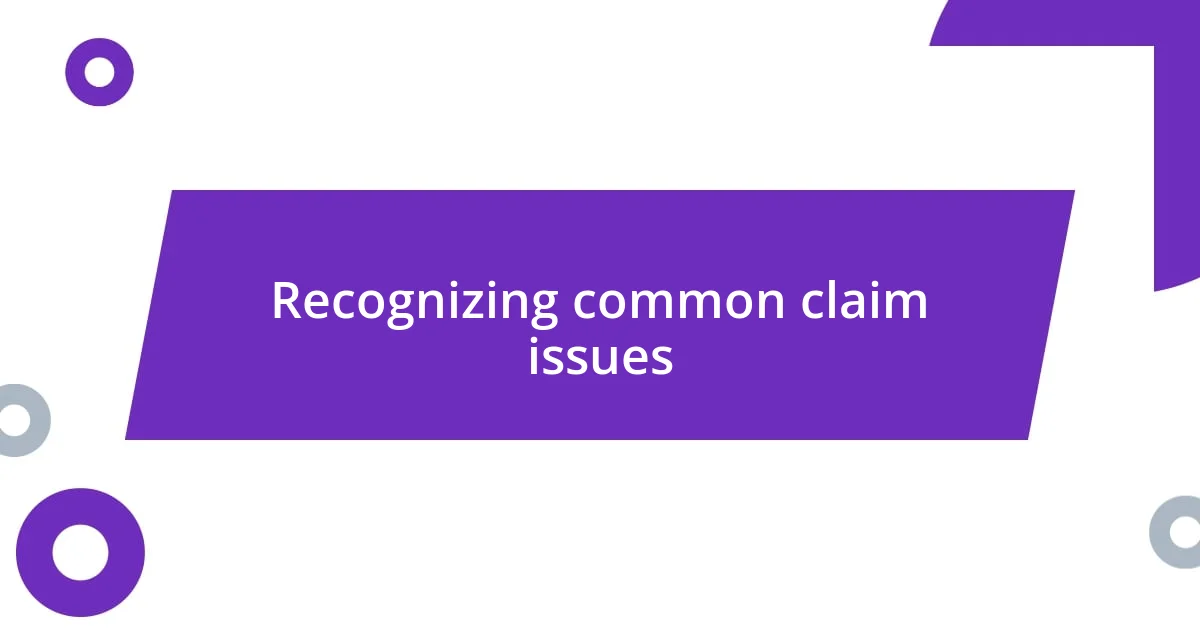
Recognizing common claim issues
Recognizing common claim issues is essential for resolving disputes effectively. In my experience, one major issue I encountered was a lack of clarity regarding coverage limits. Understanding your policy’s specifics can help you identify whether a claim is valid or unreasonable. For example, when I first filed a claim, I assumed my damages were fully covered, but I quickly learned that the policy had limitations I hadn’t noticed, leading to initial confusion.
Another frequent issue is incomplete documentation. Early on in my claims journey, I learned the hard way that not having all the required paperwork can derail even the most straightforward claims. There was a time when I submitted a claim and forgot to include a critical receipt. It became a back-and-forth struggle that could have been avoided with proper preparation. Ensuring you have everything ready can save you a world of stress.
Lastly, differing interpretations of policy language can spark disagreements. Insurance jargon can be confusing, and I remember reading a phrase that left me scratching my head. Misunderstandings can easily arise from vague terms, leading to claims being denied or disputed. Making a point to ask questions and clarify what certain terms mean can prevent a lot of headaches later.
| Claim Issue | Impact on Dispute |
|---|---|
| Lack of clarity on coverage limits | May lead to confusion about what is covered |
| Incomplete documentation | Can delay processing or lead to denial of claims |
| Differing interpretations of policy language | Can cause miscommunication and disputes |
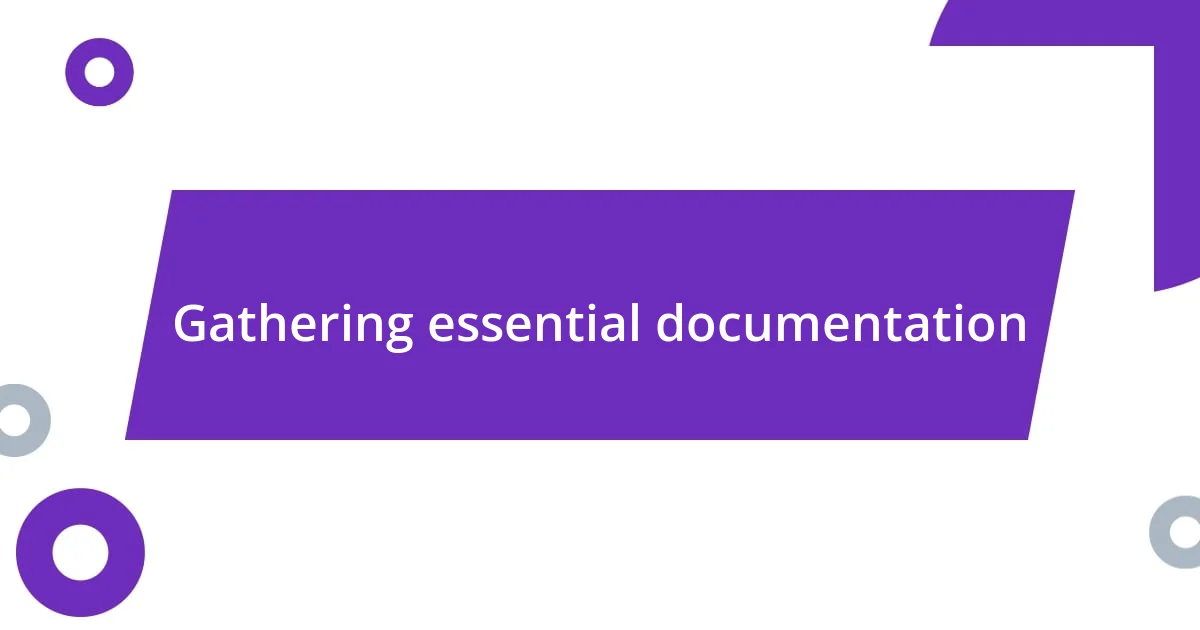
Gathering essential documentation
Gathering essential documentation is a pivotal step in dealing with claim disputes. I’ve learned that having everything organized not only aids in recalling details but also shows your commitment to resolving the issue. I vividly recall a situation where I compiled every email, receipt, and document related to my claim meticulously. When I finally presented it to the insurance adjuster, I could see their respect for my thoroughness—it truly made a difference in how the conversation unfolded.
Here’s a checklist of essential items you should consider collecting:
- Claim forms: Ensure that all forms are complete and submitted correctly.
- Correspondence: Keep records of all emails and letters exchanged with the insurance company.
- Receipts and invoices: Document any expenses related to the claim to support your case.
- Photos or videos: Visual evidence can be powerful in illustrating damage or loss.
- Witness statements: If applicable, gather statements from third parties who can corroborate your claim.
- Policy documents: Have a clear understanding of your coverage and limits to reference when needed.
By compiling these documents, I found that I could anticipate questions from the insurer, leading to a more effective resolution. This proactive approach alleviated some of the anxiety surrounding the claims process, allowing me to approach discussions with confidence.
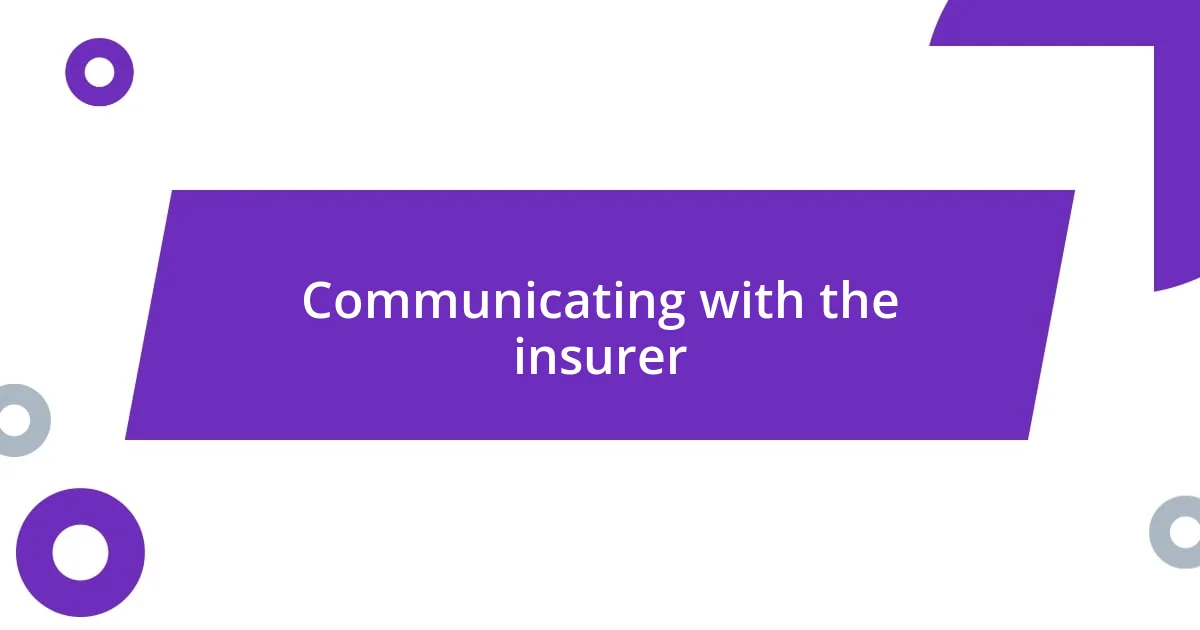
Communicating with the insurer
Effective communication with your insurer can make or break the outcome of your claim dispute. I remember feeling overwhelmed during my first interaction with an adjuster. It was like speaking different languages! I found that preparing a list of clear, concise questions helped me stay focused while addressing my concerns. When I asked about specific policy terms, I could almost feel the tension lifting as they appreciated my effort to understand.
It’s essential to establish a respectful and collaborative tone during conversations. There was a time when I felt frustrated by an initial denial, and I expressed my disappointment rather than anger. Surprisingly, this openness led to a more productive dialogue. Insurers are more willing to assist when they sense a genuine desire for resolution. In my experience, patience and kindness can pave the way for clearer answers.
I also discovered that regular follow-ups are crucial. After I submitted a claim, I made it a point to check in weekly, which kept my case fresh in the adjuster’s mind. I still remember how my frustration turned into relief when my persistent communication finally led to a breakthrough in my case. Does it seem daunting to keep such a routine? Trust me; the effort is worth it when you see results!
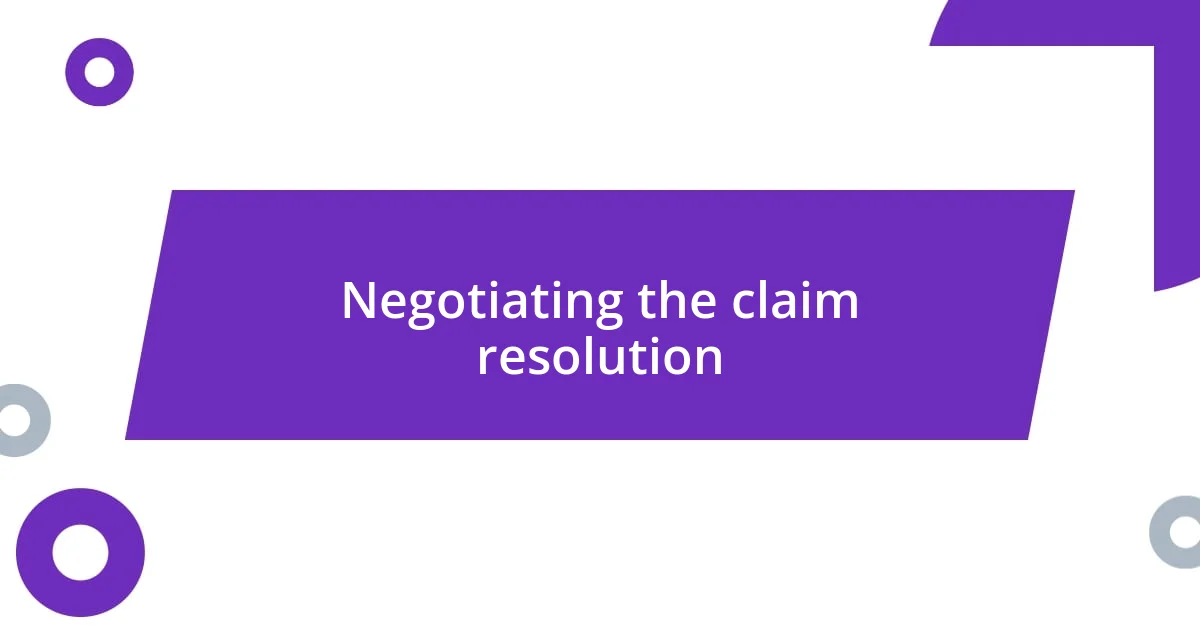
Negotiating the claim resolution
Negotiating the terms of a claim resolution can feel like walking a tightrope; it requires balance and strategy. When I found myself in a standoff with an insurer over a denied claim, I quickly realized that assertiveness was key. I approached the negotiation by pinpointing the areas where I believed they could reconsider their stance. It felt empowering to present my case logically, articulating the reasons behind my request, grounded in my policy details.
One particular moment sticks out to me. As we discussed the claim, I noticed the adjuster’s tone shift when I presented my supporting evidence with confidence. They went from dismissive to genuinely engaged, which was a turning point in our dialogue. It made me think—how often do we underestimate the power of our voices in these situations? My own journey taught me that having a respectful but firm demeanor can open doors to better outcomes.
Ultimately, I learned that flexible negotiation is essential. During one hearing, I discovered that suggesting alternative solutions—such as partial payments or adjusted compensation—could lead to a quicker resolution than sticking rigidly to my initial demands. Wouldn’t it be great if we could all approach negotiation as a collaborative effort? It worked for me, as it transformed an adversarial interaction into a more cooperative conversation.
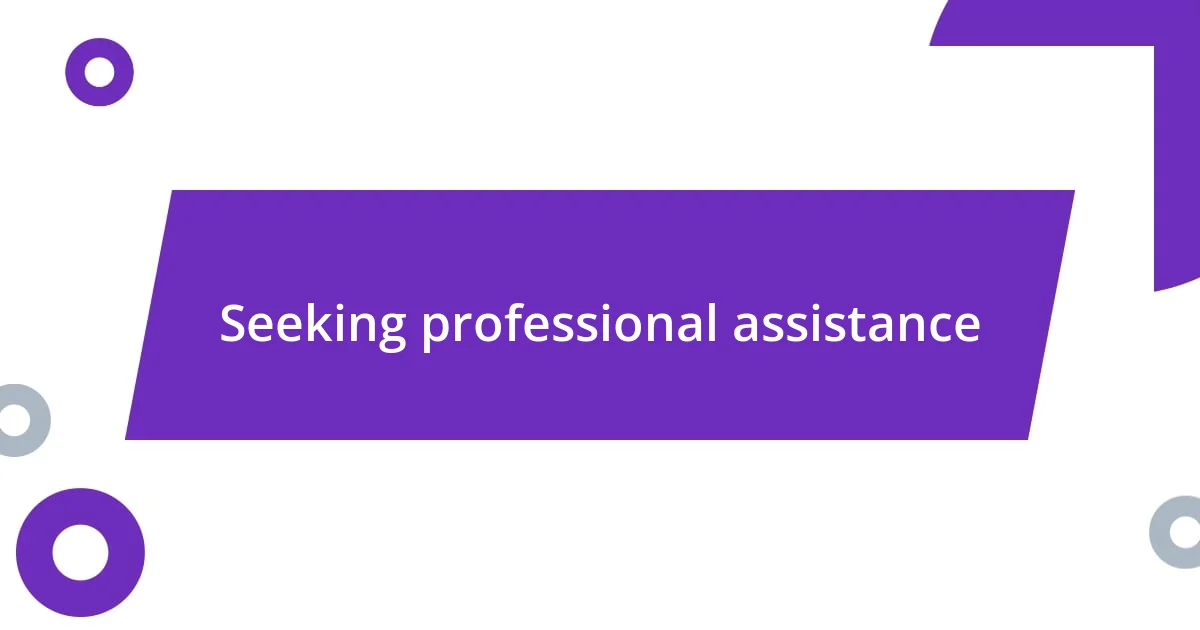
Seeking professional assistance
Seeking professional assistance can often feel like a daunting step, but it’s one I found incredibly valuable in my own claim disputes. I remember reaching out to a claim consultant when I hit a wall with my insurer. The moment I spoke with them, I felt an overwhelming sense of relief; having someone knowledgeable on my side not only guided me through the complexities but also validated my concerns. Isn’t it comforting to know you don’t have to tackle this journey alone?
Another pivotal moment occurred when I sought legal advice after my initial claim was denied. Working with an attorney who specialized in insurance disputes made a world of difference. They not only had the expertise but also the confidence that I lacked at that time. I still recall my nerves dissipating as they explained my rights in detail and laid out a clear strategy for moving forward. Does that spark a sense of encouragement, knowing that expert help can turn around what seems like a losing battle?
In my experience, the financial investment in professional assistance often pays off in reduced stress and improved outcomes. I was surprised to find that many professionals offer flexible payment options or even free consultations. This approach not only eased the financial burden but also signaled a commitment to mutual success. Have you considered how much more empowered you’d feel by having an expert advocate in your corner? It’s an option worth exploring!
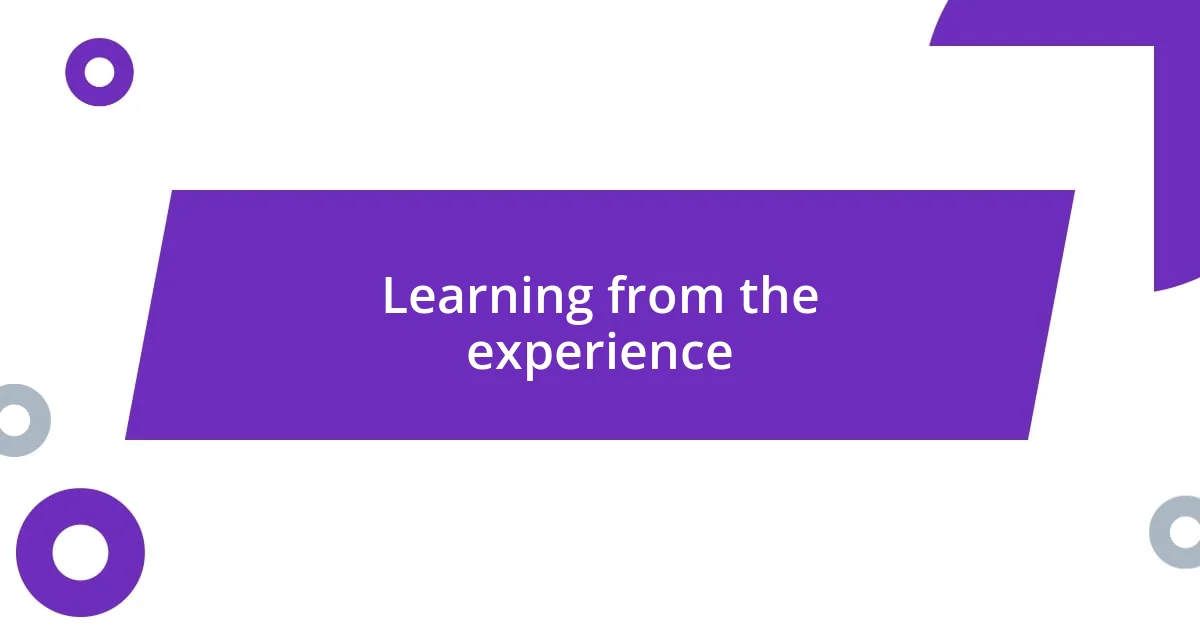
Learning from the experience
Reflecting on my experiences with claim disputes, I’ve come to realize that each challenge taught me something invaluable. For instance, I once faced a particularly tough situation when I failed to gather all necessary documents at the start. I remember the anxiety washing over me as I scrambled to provide missing information. This taught me the importance of thorough preparation. Don’t you think that having everything in order beforehand could really save a lot of stress down the line?
As I navigated the ups and downs, I learned that resilience plays a significant role. There were moments when I felt defeated, especially when I received another denial letter. But each setback became a stepping stone; I harnessed that frustration to reevaluate my strategy. I’ve often asked myself: how can we use our disappointments as fuel for growth? Embracing this mindset shifted my perspective entirely, turning obstacles into opportunities for learning.
A memorable lesson emerged when I started maintaining a journal of my claims process. Not only did it help me track my progress, but it also allowed me to reflect on what worked and what didn’t. Looking back at my notes often sparked a sense of clarity around my next steps. Can you imagine how insightful it could be to document your journey? This practice provided comfort, showing me that even in the messiness of disputes, there’s always a path forward if you choose to learn from your experiences.












